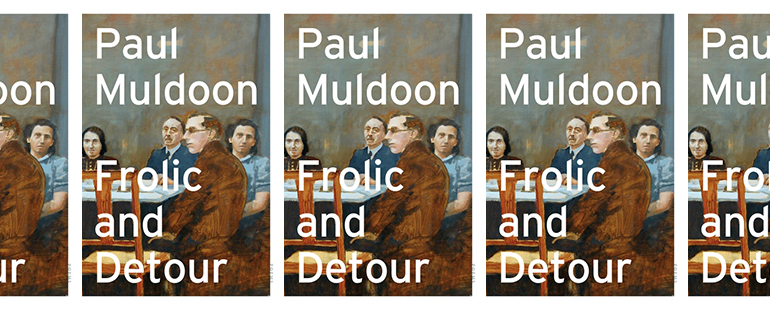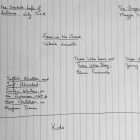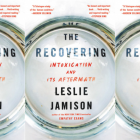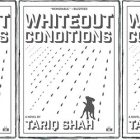Frolic and Detour by Paul Muldoon

Frolic and Detour
Paul Muldoon
Farrar, Straus and Giroux | November 19, 2019
It does not take long for Frolic and Detour to arrive in recognizably Muldoonian terrain. The collection’s second poem, “Enchereisin Naturae,” bearing epigraphs from W. B. Yeats and the Monsanto corporation, begins with what might be a memory from Paul Muldoon’s childhood on an Ulster farm: “Not for the first time would we wrest the heavy door / of the barn from its jambs.” Immediately, though, County Armagh morphs into Egypt on the eve of the exodus: “the door had been painted with the red of iron ore, / the posts daubed with the blood of a lamb / to protect us from the Angel of Death.” A beat later, Yeats’s “primary” and “antithetical” gyres make an entrance: “It all had to do with interpenetrating cones.” Ireland (Parnell, Wolfe Tone’s United Irishmen), the Book of Exodus (manna, Egypt), Yeatsiana (Coole Park, apple blossoms), and a couple of characters named Tom Trout and Michael Minnow continue to meet in intersecting patterns over the course of what turns out to be a crown of sonnets—moreover, a heroic crown, in which a fifteenth sonnet is formed from the first lines of the preceding fourteen. Enchereisin naturae, an alchemical term of art for how spirit was bound to matter, might be equally relevant to Northern Ireland’s relationship to the United Kingdom, Yeats’s poetics, the miracles with which Moses confronted Pharaoh, and Monsanto’s claim to intellectual property in seeds.
Such tours de force have been Muldoon’s calling card for a long time now. He published his first book at the age of twenty-one; Frolic and Detour is his thirteenth collection, with him now two years shy of seventy. One might say he has made the journey from enfant terrible to institution (a limited edition of Enchereisin Naturae, with engravings by Barry Moser, has a four-figure price tag). As an enfant, though, Muldoon was never so much terrible in the Rimbaud or Jim Morrison vein as he was sly and subversive, deploying his astonishing technical gifts to undermine and unsettle rather than to overturn. As an institution, likewise, he remains irreverent and puckish. Like Bob Dylan, he makes a point of never being exactly where we expect him to be while somehow remaining distinctively himself.
Muldoon’s extraordinary facility with both familiar and rare closed forms and his acrobatically inventive rhyming and off-rhyming have diminished not a whit in his sixties. “With Joseph Brant in Canajoharie” gives us not only “Canajoharie” / “chokecherries,” but also “Tomahawks” / “demagogues.” Similarly Muldoonian is the wit of “Position Paper,” an anthology of detourné proverbs:
In for a penny, in for a pound of cure.
A journey of a thousand miles begins when you hitch
your wagon to a star. Take care
not to count your blessings before they hatch.
Poets as formally dexterous as Muldoon run the risk of being accused of emotional dryness or chilly indifference to the urgent sociopolitical concerns of the hour, and both charges have at times been floated in his direction. Neither applies. He has written affecting poems out of his personal and family history, such as “Incantata” in The Annals of Chile, or “At Tuam” in the new volume. His poems about the Troubles lost none of their power for being formally ingenious. “Wire,” in Hay, evoked the lasting trauma of living with political violence so convincingly that the reader might not immediately notice it was a sestina. “1916: The Eoghan Rua Variations,” in Frolic and Detour, consists of nine sonnets, but sonnets with the sestina in the middle—a 4-6-4 rhyme grouping—each of the nine ending with a different translation of a quatrain attributed to the eighteenth-century Irish language poet Eoghan Rua Ó Súilleabháin. The sonnets steer clear of the elegiac or heroic mode we would expect from a commemoration of the centennial of the Easter Rising—revered historical figures like Patrick Pearse, the Countess Markiewicz, and Michael O’Rahilly (all also poetically celebrated by Yeats) race around Dublin as though in a Marx Brothers movie—yet the recurring-yet-evolving Ó Súilleabháin quatrain achieves a mysterious solemnity, tolling like a bell, reminding us of a national hope it took centuries to bring about: “The air tastes of grit. The world offers no safe berth. / Tsar Alexander. The Kaiser. Their serried ranks. / Tara is debased. You see how deep Troy lies beneath earth. / The very English will sink as those sank.”
Centennial awareness appears also in a group of poems on the First World War, devoted to the Ulster Division, the death of Wilfred Owen, and Edward Elgar’s Cello Concerto in E Minor. A few poems respond to the advent of Donald Trump: “Position Paper,” “A Rooster in Tepoztlán,” and “It Wasn’t Meant to Be Like This,” which laments, “We were meant to stride along the higher ground / rather than slouch towards Bethlehem.” This, incidentally, is not the volume’s first allusion to Yeats’s famous apocalyptic poem. In “Memphis,” the Sphinx that in Yeats was “moving its slow thighs” is, as imagined by Muldoon, more concerned about its knees:
My face was the face on the royal sarcophagus
I’d guarded for many an age, my haunch the lion-haunch
Of the sun-god, Sekhmet.
All I had to go on was the hunch
That if I could but focus
On the task I might eventually will the hinge
Of my knee to move. I’d already consulted the schemata
Of the necropolis so was able to inch
Past the pyramids.
“Memphis” is an oddly reassuring poem—this apocalypse, too, shall pass.
Nothing is more Muldoonian than ending a book with a long poem—every collection since Why Brownlee Left in 1983 has ended so—and it is hard to imagine a more Muldoonian long poem than “Frolic and Detour.” Four sections, each of fifteen quatrains, rhymes like “crème de la crème” and “Bill Graham,” all centered (if a Muldoon poem may be said to have a center) on the Woodstock Music and Arts Fair of fifty years past—the frolic?—with side trips—the detours?—through Peter Pan, Wilfred Owen, and Robert Lowell, to name a few. Some Oulipo-like algorithm seems to keep generating the side trips: a reference to Troglodytes summons up British rockers the Troggs, whose obscenity-laden studio chatter produced the bootleg hit Troggs Tapes in the 1970s, and whose classic “Wild Thing” was covered at the Monterrey Pop Festival by Jimi Hendrix, who at Woodstock covered “The Star-Spangled Banner”—they all show up, and Francis Scott Key as well.
The volume is Muldoonian, too, in including several elegies: C. K. Williams, Richard Wilbur, Leonard Cohen, John Ashbery. The examples of Cohen and Ashbery seem peculiarly apposite as Muldoon wheels into what may be his “late” phase. Like Ashbery in his final collections, or Cohen in his final albums, Muldoon has nothing left to prove, and can take delight simply in doing what he inimitably does. And his delight is ours.



